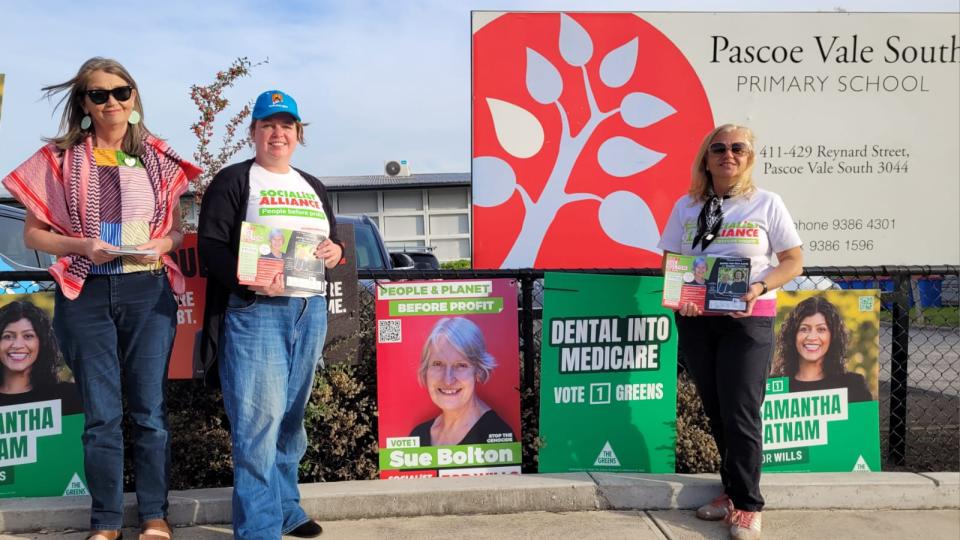Election 2025: Voters reject ‘Trump-lite’ but will Labor deliver?

The Anthony Albanese Labor government secured a second term, with a landslide victory in the May 3 federal election. But unless unions, social and community movements organise for real change, Labor will continue to bend to the will of the billionaire class.
While the cost-of-living and housing affordability crisis were critical for many voters, especially younger ones, neither major party offered any structural solutions.
Labor won because people roundly rejected the Donald Trump-lite politics of Peter Dutton’s Coalition. Dutton loss of his own seat to Labor’s Ali France shows just how out of touch the Liberals are.
While there is a dangerous rise in support for the far-right, most voters rejected Dutton’s culture war on migrants, trans people and more fuel efficient vehicles. His decision not to stand in front of the Aboriginal and Torres Strait Islander flag and lack of respect for Welcome to Country ceremonies also sank like a stone. The publicly-funded, expensive and dangerous nuclear power plan, designed to help the fossil fuel corporations continue to trade, was never a hit. His policy to slash public servant jobs and scrap work-from-home rights alienated many, specifically women and marginalised groups.
There was a swing of 3.6% against the Coalition which lost at least 13 seats, the majority of which went to Labor, which has picked up at least seven.
The 2.2% swing to Labor squeezed out Greens MPs Max Chandler-Mather and Stephen Bates in Griffith and Brisbane as former Liberal voters moved to Labor. The Greens look likely to hold the seat of Ryan, while party leader Adam Bandt is still fighting for his seat of Melbourne.
In Wills, another closely contested seat between the Greens and Labor, Peter Khalil MP looks likely to be re-elected against Greens challenger Samantha Ratnam, despite the Greens achieving a swing of 2.56%.
While the establishment and corporate media are crowing about the Greens losing some House of Representatives seats, the party’s national vote dipped by only 0.4% to 11.83% and it looks like all their Senators will be re-elected. Hannah Thomas, the Greens challenger in Grayndler, Anthony Albanese’ seat, received 25.55%, a +4% swing. Palestinian activist and Greens candidate Remah Naji received 21%, a +0.81 swing, in the seat of Moreton in south Brisbane.
The combined national vote of Labor and the Coalition was about 67% — a drop from 2022 — a reminder that people are sick of the major parties not acting in their interests and that, despite the variations from election to election, the share of the vote going to Labor and the Coalition is continuing to shrink.
Far-right parties such as One Nation (+1.27%), Family First (+1.71%) and Clive Palmer’s Trumpet of Patriots (+1.46%) increased their national vote slightly. The Legalise Cannabis party did also (+1.11%).
The Teal independents retained their seats, with Goldstein still to be decided between Zoe Daniel and the Liberal’s Tim Wilson. Independent Nicolette Boelle received a huge 11.7% swing in the Liberal seat of Bradfield, with the winner coming down to preferences and postal votes.
In Fremantle, independent Kate Hullet took 23% of the primary vote and is locked in a tight battle with sitting Labor MP Josh Wilson.
Pro-Palestine independents Ahmed Ouf received 20.58% in Blaxland and Dr Ziad Basyouny received 15.58% in Watson, both seats in Western Sydney. These strong votes reflect anger at Labor over its support for Israel’s genocide in Gaza.
Support for socialists increased in Victoria, New South Wales and Queensland and Western Australia.
Socialist Alliance’s long-term Merri-bek councillor Sue Bolton received 8.4% in the seat of Wills, a swing of +5.49%. Victorian Socialist candidates in Scullin, Cooper and Fraser received 7.01%, 9.25% and 6.64% respectively. In regional Victoria, Socialist Alliance’s Sarah Hathway received 3% in Corio and Victorian Socialists’ Rohan Taylor received 1.7% in Bendigo.
At the time of writing, Victorian Socialists Senate candidate Jordan Van Den Lamb has 1.97% of the vote, a rise from 0.57% in 2022. In some Victorian booths, socialist candidates outpolled the far-right parties and the Liberal Party.
Socialist Alliance (SA) candidates in Western Australia, Queensland and New South Wales received modest vote rises in the Senate and in the lower house seats where they ran. SA’s Joshua Last in Fremantle scored 0.9%; Alex Bainbridge in Rankin 1.90%; Steve O'Brien in Newcastle 1.6% (up from 1% in 2010) and Rachel Evans in Sydney 2.26% (up from 1.47% in 2022). SA’s NSW Senate vote is currently at 0.31%; in Queensland 0.70% and in Western Australia 0.16%.
While the socialists campaign with minuscule campaign funds compared to the major parties, and are largely ignored by the corporate media, these results show a growing interest in socialist solutions.
Progressive-minded people should take heart that the Australian version of Trump was strongly rejected. But, as its first term showed, Labor is more interested currying favour with the corporate class than leading with structural reforms.
Labor went to the election with a number of very modest proposals, including improving bulk billing rates and cutting 20% of student debt. These good policies do not go far enough. University education needs to be made free again and general practice provided by salaried doctors as part of the public health system.
There is no reason to expect that Labor's increased majority means it will move to the left. Working people will continue to bear the brunt of a system in crisis unless the union and social movements get organised to demand Labor uses its second term to deliver on real housing affordability and other cost-of-living solutions, as well as developing an independent foreign policy which includes cutting political and military ties with genocidal Israel. Labor has no plan to achieve a safe climate.
Join Socialist Alliance to help strengthen those movements. We have no time to waste.
[Jacob Andrewartha is a Socialist Alliance national co-convenor and Isaac Nellist is a member of the Socialist Alliance National Executive.]